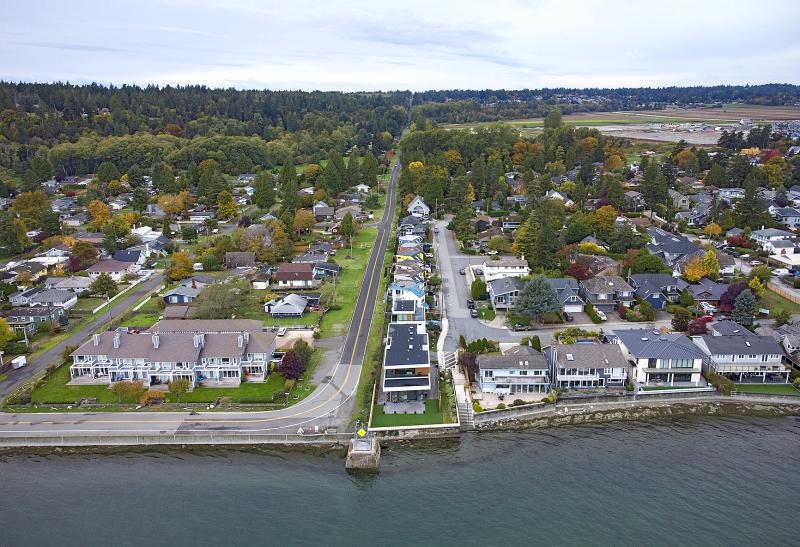Beleaguered business owners and families separated by COVID-19 restrictions on Wednesday rejoiced after the US said it would next month reopen its land borders to non-essential travel, ending a 19-month freeze.
Travel across land borders to Canada and Mexico has been largely restricted to workers whose jobs are deemed essential.
Rules would allow fully vaccinated foreign nationals to enter the US regardless of the reason starting early next month, when a similar easing of restrictions is set for air travel. By mid-January, even essential travelers seeking to enter the US, such as truck drivers, must be fully vaccinated.

Photo: AP
Shopping malls and big retailers in US border towns whose parking spaces had been filled by vehicles with Mexican license plates were hit hard by the travel restrictions.
San Diego Mayor Todd Gloria said the economic effects were hard to quantify, but can be seen in the sparse presence of shoppers at a high-end outlet mall on the city’s border with Tijuana, Mexico.
The decision comes at a critical time ahead of the holiday shopping season.
In Nogales, Arizona, travel restrictions forced about 40 retail businesses to close on the main strip in the city of 20,000 people, said Jessy Fontes, board member of the Nogales-Santa Cruz County Chamber of Commerce and owner of Mariposa Liquidation Store, which sells household appliances.
His sales fell 60 percent and he considered closing, but instead cut his staff from seven to two.
In Del Rio, Texas, Mexican visitors account for about 65 percent of retail sales, said Blanca Larson, executive director of the chamber of commerce and visitors bureau in the city of 35,000 people.
“Along the border, we’re like more of one community than two different communities,” she said.
The ban has also had enormous social and cultural impact, preventing family gatherings when relatives live on different sides of the border. Community events have stalled even as cities away from US borders have inched toward normalcy.
In Sault Ste Marie, Michigan, where ice hockey and skating are ingrained, the Soo Eagles have not had a home game against Canadian opponents in 20 months. The players, 17 to 20 years old, have been traveling to Canada since border restrictions were lifted there two months ago. Now the US team can host.
“I almost fell over when I read it,” said Ron Lavin, co-owner of the Eagles. “It’s been a long frustrating journey for people on a lot of fronts far more serious than hockey, but we’re just really pleased. It’s great for the city.”
Fully vaccinated US citizens and permanent residents have been allowed into Canada since August, provided they have waited at least two weeks since receiving their second vaccine dose and can show proof of a recent negative COVID-19 test. Mexico has not enforced COVID-19 entry procedures for land travelers.
Last month, the US announced it would end country-based travel bans for air travel and instead require vaccination for foreign nationals seeking to enter by plane.

POLITICAL PRISONERS VS DEPORTEES: Venezuela’s prosecutor’s office slammed the call by El Salvador’s leader, accusing him of crimes against humanity Salvadoran President Nayib Bukele on Sunday proposed carrying out a prisoner swap with Venezuela, suggesting he would exchange Venezuelan deportees from the US his government has kept imprisoned for what he called “political prisoners” in Venezuela. In a post on X, directed at Venezuelan President Nicolas Maduro, Bukele listed off a number of family members of high-level opposition figures in Venezuela, journalists and activists detained during the South American government’s electoral crackdown last year. “The only reason they are imprisoned is for having opposed you and your electoral fraud,” he wrote to Maduro. “However, I want to propose a humanitarian agreement that

ECONOMIC WORRIES: The ruling PAP faces voters amid concerns that the city-state faces the possibility of a recession and job losses amid Washington’s tariffs Singapore yesterday finalized contestants for its general election on Saturday next week, with the ruling People’s Action Party (PAP) fielding 32 new candidates in the biggest refresh of the party that has ruled the city-state since independence in 1965. The move follows a pledge by Singaporean Prime Minister Lawrence Wong (黃循財), who took office last year and assumed the PAP leadership, to “bring in new blood, new ideas and new energy” to steer the country of 6 million people. His latest shake-up beats that of predecessors Lee Hsien Loong (李顯龍) and Goh Chok Tong (吳作棟), who replaced 24 and 11 politicians respectively

Young women standing idly around a park in Tokyo’s west suggest that a giant statue of Godzilla is not the only attraction for a record number of foreign tourists. Their faces lit by the cold glow of their phones, the women lining Okubo Park are evidence that sex tourism has developed as a dark flipside to the bustling Kabukicho nightlife district. Increasing numbers of foreign men are flocking to the area after seeing videos on social media. One of the women said that the area near Kabukicho, where Godzilla rumbles and belches smoke atop a cinema, has become a “real

‘WATER WARFARE’: A Pakistani official called India’s suspension of a 65-year-old treaty on the sharing of waters from the Indus River ‘a cowardly, illegal move’ Pakistan yesterday canceled visas for Indian nationals, closed its airspace for all Indian-owned or operated airlines, and suspended all trade with India, including to and from any third country. The retaliatory measures follow India’s decision to suspend visas for Pakistani nationals in the aftermath of a deadly attack by shooters in Kashmir that killed 26 people, mostly tourists. The rare attack on civilians shocked and outraged India and prompted calls for action against their country’s archenemy, Pakistan. New Delhi did not publicly produce evidence connecting the attack to its neighbor, but said it had “cross-border” links to Pakistan. Pakistan denied any connection to